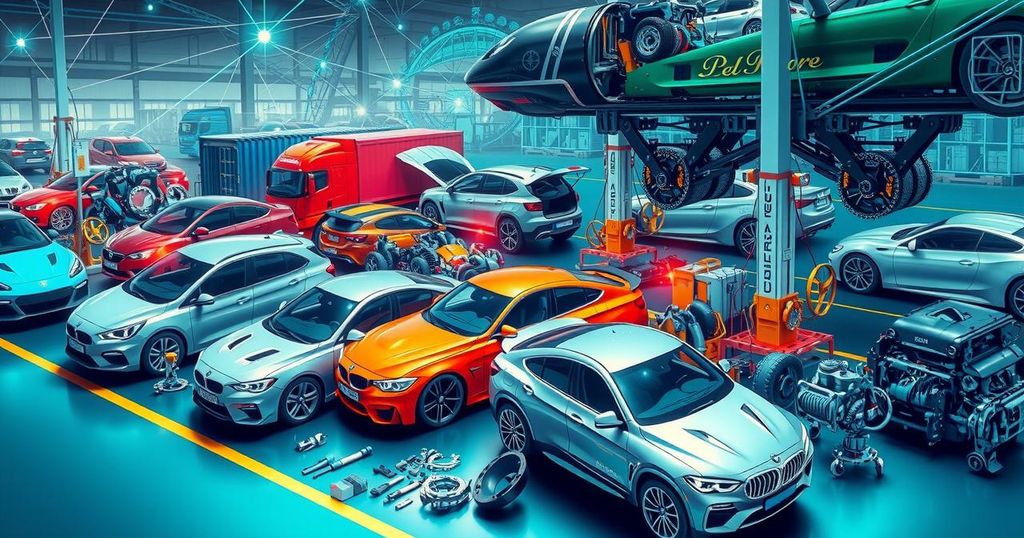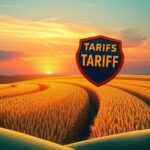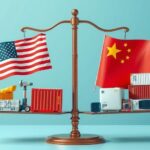Impact of Trump’s Auto Tariffs on India’s $7 Billion Component Exports
U.S. President Donald Trump has imposed a 25% tariff on auto imports, affecting India’s $7 billion component exports. JLR, India’s significant player in the U.S. market, may see profitability declines. Key components like engines will be impacted, yet overall exposure to the U.S. market remains manageable for many Indian manufacturers. Adaptation strategies may minimize disruptions.
U.S. President Donald Trump has implemented a 25 percent tariff on all auto imports, beginning April 2, which has introduced uncertainty for India’s automobile component exports valued at nearly $7 billion. While India does not significantly export cars to the U.S., Jaguar Land Rover (JLR), a subsidiary of Tata Motors, is highly established in the U.S. market, with 23 percent of its sales in FY24 coming from there. Analysts predict that JLR’s profitability may suffer as they assess options such as passing costs to consumers, reducing expenses, absorbing costs, or establishing U.S. manufacturing facilities to mitigate losses.
Currently, India’s auto component exports to the U.S. were estimated at $6.79 billion in FY24, while imports from the U.S. were around $1.4 billion with a 15 percent duty. Before the announcement, the U.S. had minimal duties on imported components, thus the new tariffs pose a significant challenge. An industry expert indicated that while car manufacturers may not experience direct major impacts, the auto components sector will likely bear the brunt of these tariffs due to significant export reliance on the U.S. market.
It is anticipated that key components like engines and transmissions will face tariffs, slightly compressing operating margins of exporters by 125-150 basis points. Exports to the U.S. represent 27 percent of India’s auto components sector revenues. While this could affect companies like Sona Comstar and Samvardhana Motherson, firms with existing U.S. manufacturing advantages may benefit from enhanced capacity use.
Experts point out that India’s overall exposure to the U.S. market in passenger cars remains very limited, with only $8.9 million in exports making up 0.13 percent of total exports. Similarly, truck exports are negligible when compared to global figures. Therefore, while the auto parts sector could face some challenges, the overall impact presents manageable levels of vulnerability.
India’s auto component industry exported $2.2 billion worth of parts to the U.S., which corresponds to 29.1 percent of total global auto part exports. Given the global context and uniform tariffs levied across nations, analysts express that Indian exporters might find unexpected openings in this scenario. Despite anticipations of a hit from the tariffs, Indian suppliers are expected to adapt to maintain their market presence.
Despite the challenges posed by Trump’s tariffs, the president of JATO Dynamics India indicated that the tariffs would impact suppliers but not dramatically affect market positions. Motherson Group, a noteworthy player in the industry, has established operations in Mexico and Canada, benefiting from regional trade agreements to supply the U.S. market more efficiently. The director of Samvardhana Motherson noted that the company employs a localization strategy to minimize tariff implications, showcasing the industry’s resilience in adapting to new market conditions.
In summary, the imposition of a 25 percent tariff on U.S. auto imports by President Trump presents significant challenges for India’s auto component exports, particularly affecting companies heavily reliant on the U.S. market. While some firms may struggle with profitability, the limited exposure of India’s vehicle exports to the U.S. and strategic localizations by industry leaders suggest that the overall impact can be managed. The situation serves as a reminder of the complexities in global trade and the potential for adverse conditions to shift competitive dynamics.
Original Source: www.hindustantimes.com








Post Comment